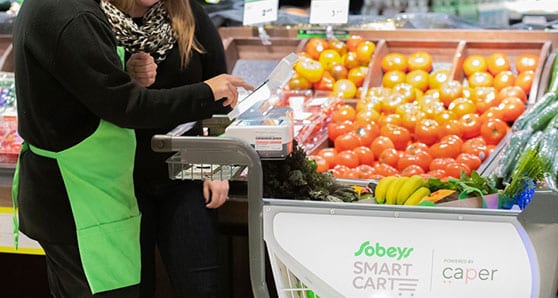 Grocery giant Sobeys has unveiled what it calls Canada’s first smart shopping cart at a store in Ontario. It’s a great idea for people looking for assistance in shopping and to be on their way as soon as possible.
Grocery giant Sobeys has unveiled what it calls Canada’s first smart shopping cart at a store in Ontario. It’s a great idea for people looking for assistance in shopping and to be on their way as soon as possible.
The project is a partnership with New York-based retail technology company Capers.
Essentially, the cart you grab as you enter the store has high-tech devices that allow customers to shop, get recipe ideas, obtain information on where to get ingredients, weigh and pay for their food. The cart also has GPS so you can find whatever you need in the store.
The Smart Cart has been developed to allow shoppers to bypass traditional checkout lanes, one of the most unpleasant parts of grocery shopping. It allows you to pay as you shop. Your cart, then, is your shopping buddy.
Amazon Go’s grocery shopping model has attracted a lot of attention. It’s a cashier-less store with millions of sensors allowing you to choose the products you need and walk away. The money is automatically withdrawn from the bank accounts of pre-registered shoppers. The company plans to open as many as 3,000 Amazon Go cashier-less stores over the next few years.
| RELATED CONTENT |
| Why Sobeys had to dump Air Miles By Sylvain Charlebois |
| Online grocery retailing ramped up by Sobeys By Sylvain Charlebois |
| COVID-19 will change how we buy food, forever By Sylvain Charlebois |
Caper, an artificial intelligence (AI) company, has a different spin on a cashier-less world. Instead of installing high-tech cameras and sensors in ceilings and on shelves, the purchasing automation is part of the cart itself.
The cost to equip a store with multiple sensors can be prohibitive, especially for a low-margin industry like the grocery business. The smart cart allows a brick-and-motor outfit to adopt state-of-the-art technology without costly adjustments to its infrastructure. This makes Caper’s value proposition for grocers quite attractive.
But only time will tell if consumers will embrace a model that requires little or no human interaction.
The intrusion of all this new technology makes some people uneasy. Consumer-focused AI, or in-store customer experience technology, is slowly becoming a disruptive force within the food industry, as it has in other economic sectors. Technology is replacing humans. AI is slowly taking over many services, with the goal of making our economy more robust.
However, whether these technologies will allow grocers to generate more revenues remains to be seen. Monetizing convenience in this sector isn’t easy. It may just be that these measures are all about cutting costs – labour costs specifically.
So the socio-economics of these technologies should also be considered.
Supplanting jobs with automation has increased over the years. And often these lost positions were performed by females. We’ve barely looked at how technological-enabling features impact the food industry, let alone society in general.
And almost one million Canadians have no bank account or credit card. A Smart Cart is a nonstarter for them. A cashless economy could be seen as discriminatory, which is why grocers approach AI-enabling technologies with extreme caution and Sobeys’ initiative is just a pilot. Legal cases are already arising in the U.S.
History shows that AI won’t completely replace people. But it will amend people’s roles so they can devote more time developing strategies, getting new leads and building relationships with vendors.
There’s a huge strategic deficit in the grocery sector. Industry leaders are the first to admit it. AI will enable retailers to better understand consumer psychology. In turn, inventory management can be greatly enhanced. Unlike Amazon, the legacy grocery sector was never good at that. It’s playing catch-up now.
But AI has its benefits when it comes to managing manpower, since finding people to work in grocery stores can be a challenge. As a result, self-checkout lanes made their way into grocery stores almost 20 years ago. And the use of self-checkouts has increased by 17 per cent this year alone in Canada. But many wonder if patrons should be compensated for the work they do in the self-checkout process – work traditionally done by store employees.
What Sobeys and Caper propose has none of that baggage. The consumer’s role doesn’t really change if the technology works and offers a frictionless experience.
It’s a step forward, even if the path to more AI in grocery retail will remain challenging for a while. But the day will come when most of us can buy groceries without talking to anyone.
Think that’s farfetched? When was the last time you spoke to a bank teller?
Dr. Sylvain Charlebois is senior director of the agri-food analytics lab and a professor in food distribution and policy at Dalhousie University.
Sylvain is a Troy Media Thought Leader. Why aren’t you?
The views, opinions and positions expressed by columnists and contributors are the author’s alone. They do not inherently or expressly reflect the views, opinions and/or positions of our publication.
